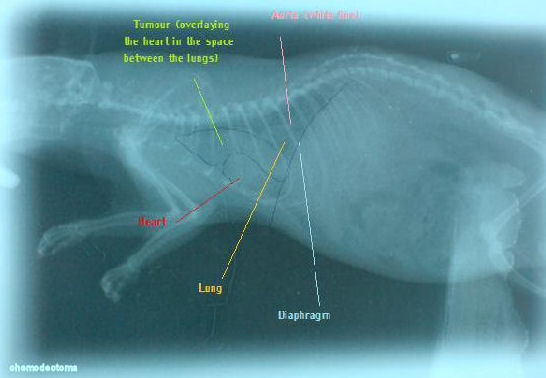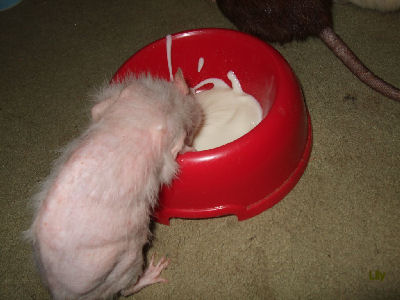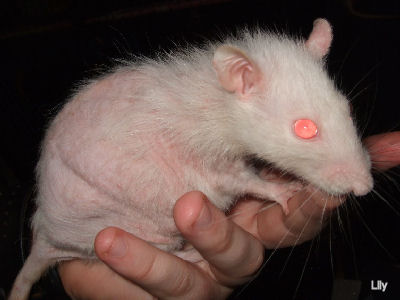Figure 7: Chemodectoma in 23-month-old female rat (Lily).
Case history and photos
History
Lily is a 23-month-old rat who has had no prior health issues.
Clinical Signs
Clinical signs presented as a typical respiratory infection including a deep chested rattle. Initially antibiotic therapy was given with little improvement, however when a long acting anti-inflammatory injection was given the clinical signs appeared to be alleviated very quickly. These same signs would occur once more approximately 3-4 weeks later when the anti-inflammatory effects began to lessen. The treatment of anti-inflammatories and antibiotics were given when needed. The antibiotics used in varying combination were Baytril, doxycycline and Zithromax.
Over the next few months the chest rattle was occurring more frequently and eventually stopped disappearing completely even with the injections of an anti-inflammatory agent. During this period she was perfectly healthy in every other aspect of her life.
The decision was made by the vet to take x-rays of Lily’s chest to rule out the possibility of masses within her lungs which might be causing the clinical signs seen. X-rays were taken and a mass was detected around her heart.
Diagnosis
Chemodectoma – is a benign, chromaffin-negative tumor of the chemoreceptor system (also called a carotid body tumor, or an aortic-body tumor). The mass is attached to her heart which is growing in the space between her lungs. The effect of the tumor on the heart causes fluid build up on her lungs which can then lead to a secondary infection. Her heart rate had also increased.
(*Note: this case is as yet unverified histologically.)
Follow-up Treatment
Lily was put onto a regime of a daily oral steroidal anti-inflammatory (Medrone V), diuretic (Frusemide/Furosemide) and a long-term course of Baytril (enrofloxacin).
Outcome
Eight months later the treatment is continuing to work. She has a constant rattle in her chest while active (and often when sleeping) but clinical signs are alleviated sporadically with the steroids.
Long term issues have been a loss of almost all of her body fur on her torso due to the steroids and tumor. Vitamin supplements are being given to assist with this, but to date have not had much effect.
Her behavior at present is that of a perfectly healthy rat. Her condition has had no effect to her quality of life thus far.
Follow-up
Subsequently: fifteen months following diagnosis and continued treatment, Lily succumbed at 28 months of age. She began to have thinning of fur on her head, along with increased loss of weight, although she maintained her appetite. Her bottom teeth thinned and stopped growing while the top teeth began to overgrow slightly. She also developed an unidentified tumor under her forelimb. However, throughout all this she continued to be active, to maintain her appetite, and be pain free up until her sudden death.
Video
Lily’s chest rattle.
Photos
 Photo 1: X-ray showing size and location of the (probable) chromodactoma. |
 Photo 2: Hairloss (alopecia) due to long term steroid therapy. |
 Photo 3: Additional view hairloss (alopecia) |
Case history and photos courtesy of Ration1802: Dedicated to Lily


